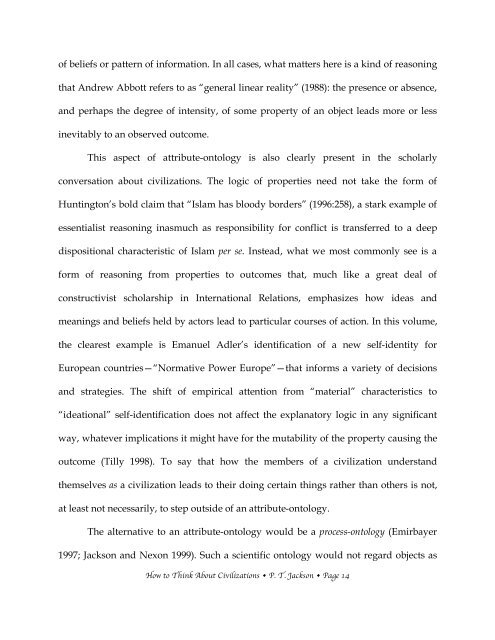How to Think About Civilizations - The Watson Institute for ...
How to Think About Civilizations - The Watson Institute for ...
How to Think About Civilizations - The Watson Institute for ...
Create successful ePaper yourself
Turn your PDF publications into a flip-book with our unique Google optimized e-Paper software.
of beliefs or pattern of in<strong>for</strong>mation. In all cases, what matters here is a kind of reasoning<br />
that Andrew Abbott refers <strong>to</strong> as “general linear reality” (1988): the presence or absence,<br />
and perhaps the degree of intensity, of some property of an object leads more or less<br />
inevitably <strong>to</strong> an observed outcome.<br />
This aspect of attribute-on<strong>to</strong>logy is also clearly present in the scholarly<br />
conversation about civilizations. <strong>The</strong> logic of properties need not take the <strong>for</strong>m of<br />
Hunting<strong>to</strong>n’s bold claim that “Islam has bloody borders” (1996:258), a stark example of<br />
essentialist reasoning inasmuch as responsibility <strong>for</strong> conflict is transferred <strong>to</strong> a deep<br />
dispositional characteristic of Islam per se. Instead, what we most commonly see is a<br />
<strong>for</strong>m of reasoning from properties <strong>to</strong> outcomes that, much like a great deal of<br />
constructivist scholarship in International Relations, emphasizes how ideas and<br />
meanings and beliefs held by ac<strong>to</strong>rs lead <strong>to</strong> particular courses of action. In this volume,<br />
the clearest example is Emanuel Adler’s identification of a new self-identity <strong>for</strong><br />
European countries—“Normative Power Europe”—that in<strong>for</strong>ms a variety of decisions<br />
and strategies. <strong>The</strong> shift of empirical attention from “material” characteristics <strong>to</strong><br />
“ideational” self-identification does not affect the explana<strong>to</strong>ry logic in any significant<br />
way, whatever implications it might have <strong>for</strong> the mutability of the property causing the<br />
outcome (Tilly 1998). To say that how the members of a civilization understand<br />
themselves as a civilization leads <strong>to</strong> their doing certain things rather than others is not,<br />
at least not necessarily, <strong>to</strong> step outside of an attribute-on<strong>to</strong>logy.<br />
<strong>The</strong> alternative <strong>to</strong> an attribute-on<strong>to</strong>logy would be a process-on<strong>to</strong>logy (Emirbayer<br />
1997; Jackson and Nexon 1999). Such a scientific on<strong>to</strong>logy would not regard objects as<br />
<strong>How</strong> <strong>to</strong> <strong>Think</strong> <strong>About</strong> <strong>Civilizations</strong> • P. T. Jackson • Page 14
















